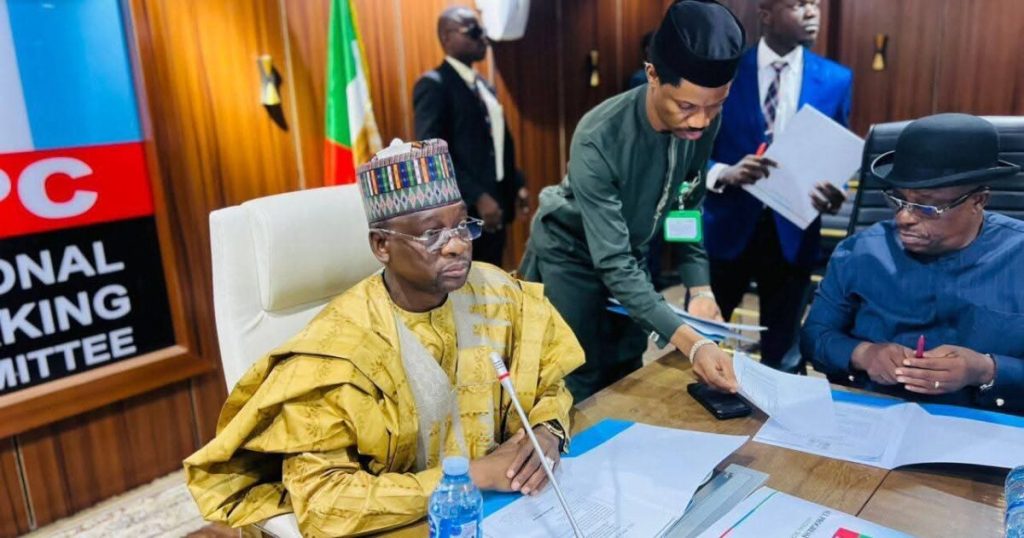Paragraph 1: Transition of Power in the All Progressives Congress
The All Progressives Congress (APC), Nigeria’s ruling party, has undergone a significant leadership change. Following the resignation of Abdullahi Ganduje as National Chairman, his deputy, Ali Bukar Dalori, has assumed the role of Acting National Chairman. This transition marks a pivotal moment for the APC as it navigates the post-Ganduje era and prepares for the 2027 elections. Dalori’s first act as Acting Chairman was presiding over a National Working Committee (NWC) meeting at the party’s headquarters in Abuja. The meeting focused on acknowledging Ganduje’s contributions, outlining Dalori’s vision for the party, and reaffirming support for President Bola Ahmed Tinubu’s "Renewed Hope Agenda."
Paragraph 2: Dalori’s Vision for a United and Forward-Looking APC
In his address to the NWC, Dalori emphasized unity, transparency, and inclusiveness as guiding principles for his leadership. He acknowledged the weight of the responsibility placed upon him and pledged to work diligently to meet the expectations of party members and supporters nationwide. Dalori underscored the importance of focusing on the broader goal of delivering good governance to the Nigerian people and strengthening the party’s internal democratic processes. Looking ahead to the 2027 elections, he called for a revitalization of party structures at all levels, reconnecting with the grassroots, and strengthening internal processes to ensure a strong and cohesive party ready for future challenges.
Paragraph 3: Reaffirming Support for Tinubu’s "Renewed Hope Agenda"
A central theme of the NWC meeting was the reaffirmation of the party’s unwavering support for President Tinubu’s "Renewed Hope Agenda." Dalori emphasized that this agenda is not merely a campaign slogan but a practical roadmap for addressing critical issues facing the nation, including economic revitalization, security concerns, and national unity. He pledged the APC’s full loyalty and partnership with the President in implementing these transformative initiatives, positioning the party as the driving force behind the nation’s progress. This public display of support underscores the APC’s commitment to aligning itself with the President’s vision and working collaboratively to achieve his goals for the country.
Paragraph 4: Navigating the Transition and Maintaining Party Unity
Dalori acknowledged that political transitions can often create uncertainty and potential divisions within a party. He stressed the importance of unity and urged members to avoid actions and words that could sow discord. He emphasized the shared belief in the promise of Nigeria and the future of the APC as the unifying force that binds the party together. This call for unity reflects an awareness of the potential challenges posed by leadership changes and a proactive approach to maintaining cohesion within the party ranks. It underscores the importance of internal stability as the APC navigates this transition period.
Paragraph 5: Formalizing Ganduje’s Resignation and the Constitutional Process
The meeting also addressed the formal aspects of Ganduje’s resignation. APC National Secretary, Ajibola Basiru, confirmed the official submission and acceptance of Ganduje’s resignation letter by the NWC. He explained the constitutional process that led to Dalori’s appointment as Acting National Chairman, citing Article 14 of the party’s constitution, which stipulates that the Deputy National Chairman assumes the role of Acting Chairman until the National Executive Committee (NEC) appoints a substantive Chairman. This adherence to constitutional procedures ensures a smooth and legitimate transfer of power within the party.
Paragraph 6: Looking Ahead: Challenges and Opportunities for the APC
The APC now enters a new chapter under Dalori’s interim leadership. He faces the challenge of unifying the party, strengthening its grassroots connections, and preparing for the 2027 elections. The success of his leadership will depend on his ability to navigate internal dynamics, effectively implement his vision for the party, and maintain strong support for President Tinubu’s agenda. This period presents both challenges and opportunities for the APC. The party has the chance to consolidate its position, address internal issues, and emerge stronger and more cohesive as it prepares for future electoral contests. The coming months will be crucial in shaping the APC’s trajectory and determining its future prospects.


